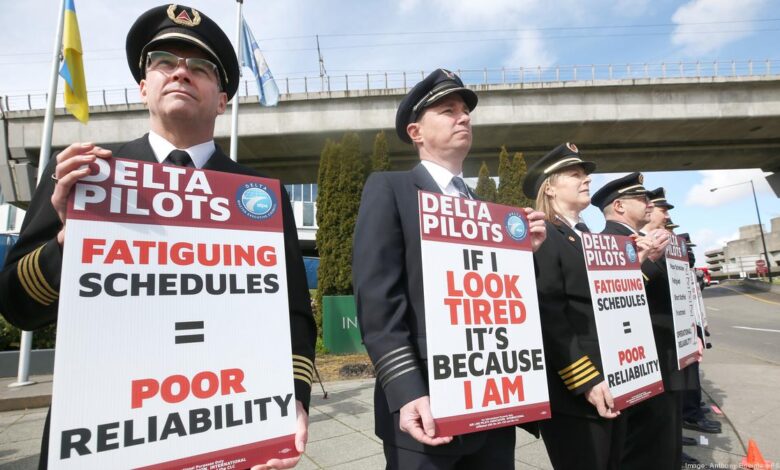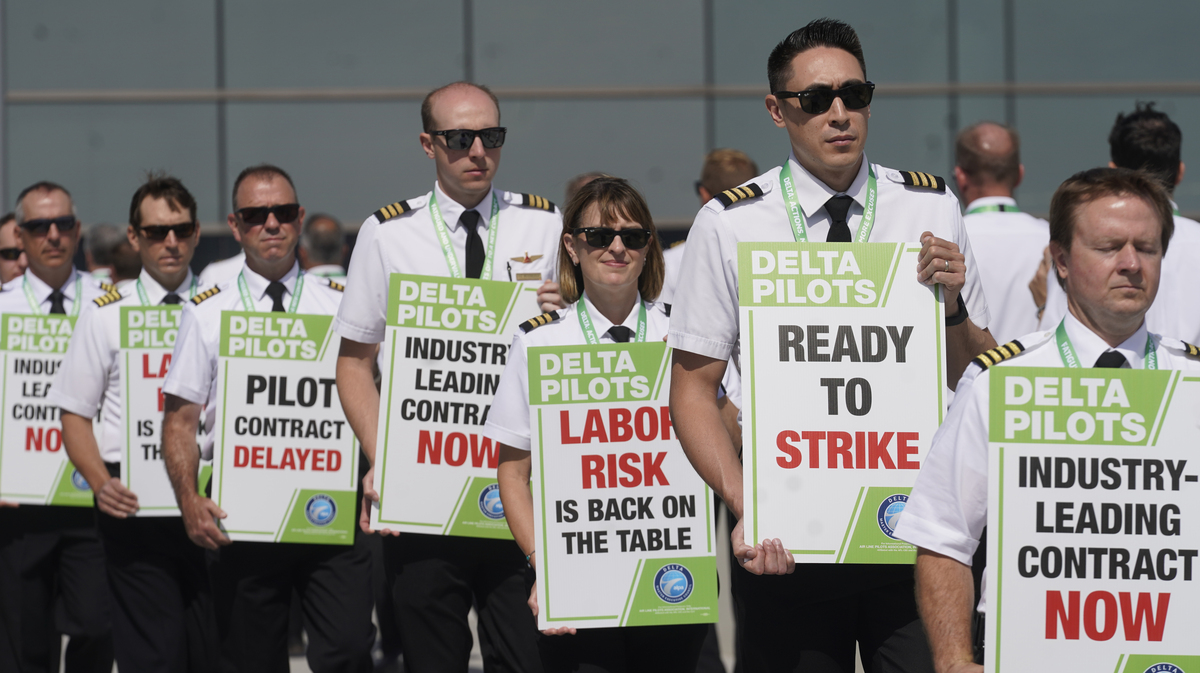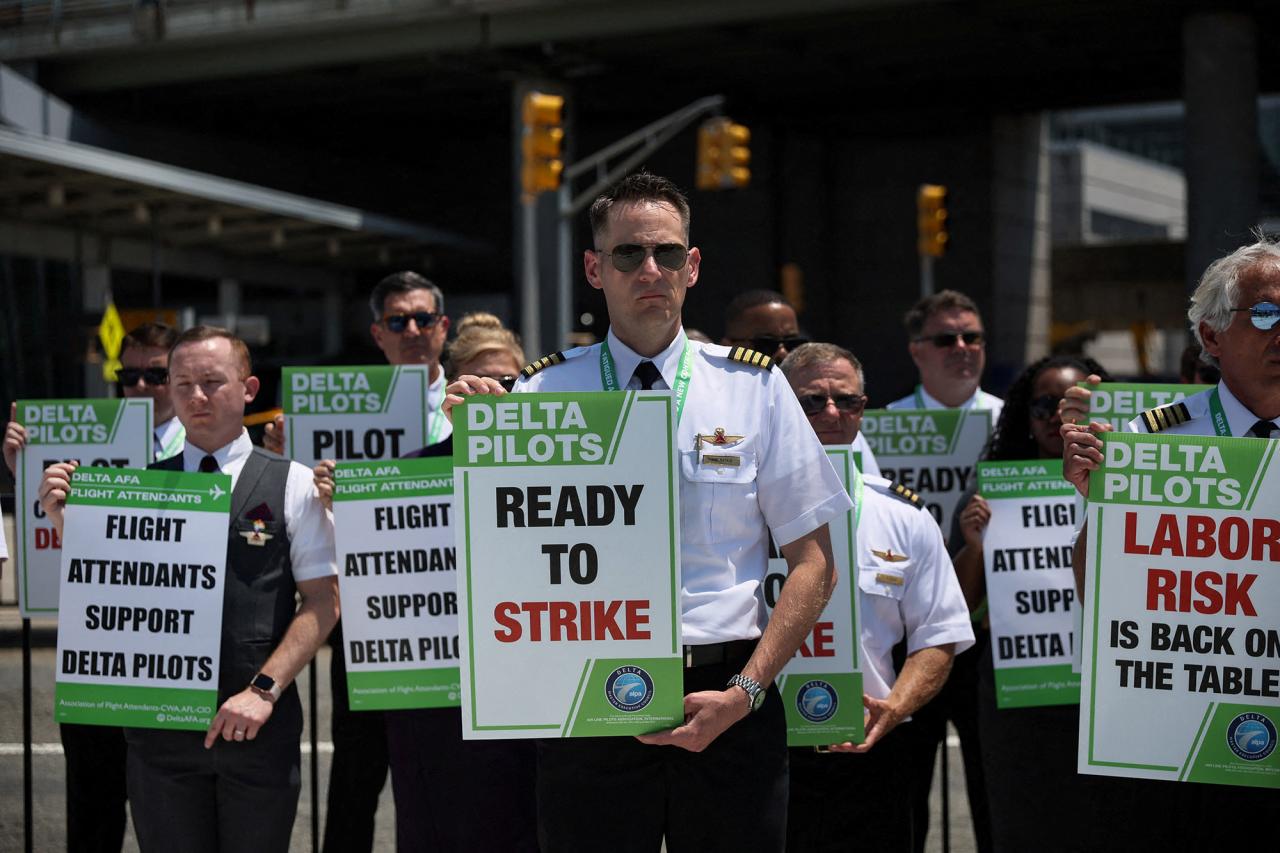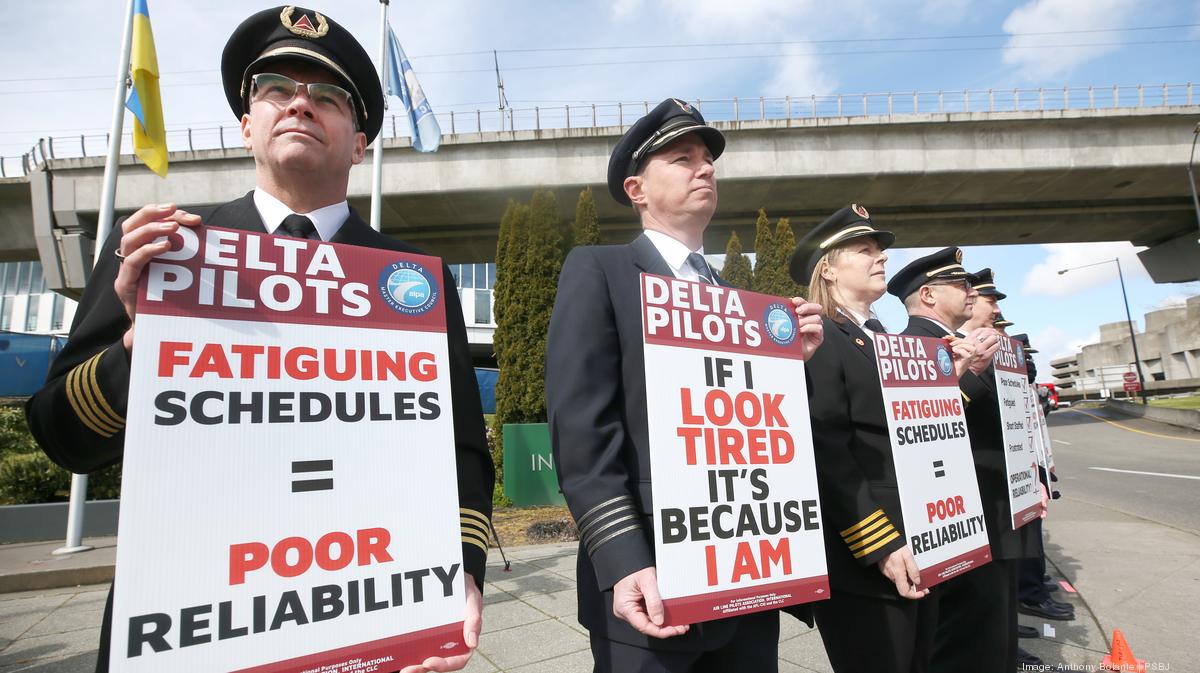
Delta Pilots Vote to Strike for New Contracts
Delta pilots vote to strike for new contracts, a move that has sent shockwaves through the aviation industry. The pilots, represented by the Air Line Pilots Association (ALPA), are demanding significant changes to their contract, citing concerns over pay, work conditions, and quality of life. This potential strike has the potential to disrupt travel plans for millions of passengers and create significant financial strain for Delta Air Lines.
The main points of contention between the pilots’ union and Delta management include issues related to pay, scheduling, and retirement benefits. The pilots are seeking a more favorable contract that addresses their concerns about excessive working hours, inadequate compensation, and a lack of job security. The negotiations have been ongoing for months, with both sides remaining steadfast in their positions.
The outcome of these negotiations will have a significant impact on the future of Delta Air Lines and the entire aviation industry.
The Delta Pilots’ Strike Vote

Delta Air Lines pilots are gearing up for a potential strike, as they have voted overwhelmingly in favor of authorizing their union to call for a walkout. This decision comes after months of contentious negotiations with the airline over a new contract, highlighting the growing tension between the pilots and management.
Reasons Behind the Strike Vote
The Delta pilots’ decision to authorize a strike stems from a deep-seated dissatisfaction with their current contract and a perceived lack of progress in negotiations with the airline. Key concerns raised by the pilots include:
- Pay and Benefits: Pilots are seeking significant improvements in pay and benefits, arguing that they have not received adequate compensation for their contributions to the airline’s success. They are demanding higher wages, improved retirement plans, and better health insurance coverage.
- Work Schedules and Quality of Life: Pilots are also expressing concerns about their work schedules, which they believe are too demanding and negatively impact their quality of life. They are seeking more predictable schedules, shorter workweeks, and improved rest periods.
- Job Security and Staffing: Another key issue is job security and staffing levels. Pilots are concerned about the airline’s hiring practices and the potential for future layoffs, particularly in light of the ongoing economic uncertainty. They are advocating for more robust staffing levels and guarantees of job security.
Key Demands of the Pilots
The pilots have presented a comprehensive set of demands to Delta Air Lines in their contract negotiations, reflecting their priorities and concerns. These demands include:
- Significant Pay Increases: Pilots are seeking substantial pay raises to reflect their skills, experience, and the demanding nature of their work. They are aiming for pay increases that are competitive with other major airlines and reflect the current economic conditions.
- Improved Retirement Benefits: Pilots are also demanding improvements to their retirement benefits, including higher contributions from the airline and greater flexibility in their retirement options. They are seeking a more secure and generous retirement plan that reflects their long-term financial needs.
- Enhanced Work-Life Balance: The pilots are seeking more predictable work schedules, shorter workweeks, and improved rest periods to enhance their work-life balance. They believe that these changes will improve their overall well-being and reduce fatigue, ultimately leading to safer operations.
- Job Security and Staffing Guarantees: The pilots are advocating for more robust staffing levels and guarantees of job security to ensure that the airline has enough pilots to meet its operational needs and to protect against potential layoffs.
Potential Impact of a Strike
A strike by Delta pilots would have a significant impact on Delta Air Lines and its passengers. The airline would likely face severe disruptions to its operations, leading to cancellations and delays of flights, impacting thousands of passengers. The strike could also lead to financial losses for Delta, as it would be unable to operate its full schedule of flights.
The Delta pilots’ vote to strike for new contracts highlights the growing tension between workers and employers in a challenging economic climate. While pilots are demanding better pay and benefits, many Americans are struggling to put food on the table due to soaring inflation, as seen in this recent article: more americans are struggling to pay for food bills amid soaring inflation.
This conflict underscores the complex challenges facing our nation, and it remains to be seen how the Delta pilots’ strike will unfold and impact the broader economy.
Passengers could face inconveniences such as missed connections, delayed travel plans, and potential disruptions to their travel arrangements.
Negotiations and Contract Issues: Delta Pilots Vote To Strike For New Contracts

The negotiations between the Delta Air Lines pilots’ union, the Air Line Pilots Association (ALPA), and Delta management have been ongoing for months, with the primary focus being a new contract for the pilots. While both sides have expressed a desire to reach an agreement, significant disagreements remain, leading to a potential strike vote by the pilots.The main sticking points in the negotiations are centered around pay, work rules, and benefits.
These issues are crucial to the pilots, as they directly impact their livelihoods and quality of life.
Pay and Benefits
The pilots’ union is seeking significant increases in pay and improvements in benefits, arguing that Delta pilots are underpaid compared to their counterparts at other major airlines. The union believes that Delta’s record profits and strong financial performance warrant better compensation for its pilots. Delta management, however, maintains that its current compensation packages are competitive and that the pilots’ demands are unreasonable.
The union is particularly concerned about the current pay structure, which they believe is outdated and does not adequately reflect the pilots’ skills and experience. The union is pushing for a more equitable pay scale that rewards seniority and experience, while Delta management is hesitant to make significant changes to the current system.In addition to pay, the union is also seeking improvements in benefits, including retirement contributions, health insurance, and vacation time.
Delta management has offered some concessions on benefits, but the union argues that these are not enough to meet the pilots’ needs.
Work Rules
Another key point of contention is work rules, which govern the pilots’ schedules, rest periods, and other aspects of their work life. The union is seeking changes to the current work rules, which they believe are too restrictive and create excessive fatigue for pilots. Delta management argues that its current work rules are necessary to ensure safety and operational efficiency.
The union is specifically concerned about the current “reserve” system, which requires pilots to be on call for potential assignments with little notice. This system, according to the union, can lead to unpredictable schedules and excessive fatigue. The union is pushing for a more predictable and less demanding reserve system, while Delta management is resistant to significant changes.
Likelihood of a Strike
The likelihood of a strike is uncertain. While the union has conducted a strike vote, the results have not yet been released. The union has indicated that a strike is a possibility if the negotiations do not result in a satisfactory contract. However, both sides have also expressed a willingness to continue negotiating and reach a settlement. The outcome of the negotiations will depend on the willingness of both sides to compromise.
The Delta pilots’ vote to strike for new contracts highlights the growing unrest within the airline industry, a reflection of the challenging economic climate and the pressure on workers. While this issue plays out, it’s hard to ignore the whistleblowers reveal fbi has voluminous evidence of potential hunter biden criminal conduct senator news that’s dominating headlines. Whether this will impact the negotiations for Delta pilots remains to be seen, but it’s certainly adding another layer of complexity to the situation.
If the union and management can find common ground on the key issues, a strike can be avoided. However, if the disagreements remain unresolved, a strike could disrupt Delta’s operations and cause significant inconvenience to passengers.
Impact on the Aviation Industry
A potential strike by Delta pilots could have significant ripple effects throughout the aviation industry, impacting not only Delta Air Lines but also other airlines and passengers. The strike’s impact would be felt across multiple sectors, including passenger travel, airline operations, and the overall economic health of the aviation industry.
Potential Economic Consequences for Delta Air Lines and its Employees
A strike by Delta pilots would significantly impact Delta Air Lines’ financial performance. The airline would experience substantial revenue losses due to flight cancellations and disruptions. Delta would also incur additional costs associated with strike-related expenses, such as providing alternative transportation options for passengers and paying wages to non-striking employees. These financial losses could have a negative impact on Delta’s profitability and could potentially lead to job losses or reduced employee benefits.For Delta pilots, a strike would mean a loss of income.
While they may receive strike pay from their union, this amount is typically significantly less than their regular wages. The strike could also strain their personal finances, leading to difficulties in meeting financial obligations. Furthermore, a protracted strike could damage the pilots’ reputation and future earning potential.
Impact on Passengers, Delta pilots vote to strike for new contracts
A Delta pilot strike would cause significant disruption for passengers, leading to flight cancellations, delays, and potential re-routing. Passengers may experience inconvenience, stress, and financial losses due to missed travel plans, hotel expenses, and missed business opportunities. In addition, passengers may face difficulty securing alternative flights with other airlines, particularly if the strike is widespread. The strike could also lead to increased airfares as airlines attempt to recover lost revenue and cover the costs of disruptions.
Impact on Other Airlines
A Delta pilot strike could create opportunities for other airlines to capitalize on the disruption. Competing airlines could attract passengers who are unable to fly with Delta, leading to increased bookings and revenue. However, the strike could also lead to a shortage of pilots in the industry, as other airlines may struggle to find qualified pilots to cover for the absent Delta pilots.
The news of Delta pilots voting to strike for new contracts has sent ripples through the industry. While this might seem like a localized issue, it highlights the potential for disruptions in global supply chains. It’s worth noting that according to the International Energy Agency, US and other IEA members have huge oil reserves that can be tapped if supply is disrupted , but even these reserves can’t fully compensate for a major disruption in the aviation sector.
The Delta pilots’ strike is a reminder of the delicate balance between labor rights and the smooth functioning of global transportation systems.
This could lead to staffing shortages and operational challenges for other airlines.
Potential Impact on Stakeholders
The following table summarizes the potential impact of a Delta pilot strike on different stakeholders:| Stakeholder | Potential Impact ||—|—|| Passengers | Flight cancellations, delays, re-routing, increased airfares, missed travel plans, financial losses || Delta Pilots | Loss of income, financial strain, potential damage to reputation || Delta Air Lines | Revenue losses, increased expenses, potential job losses or reduced employee benefits, damage to reputation || Other Airlines | Potential for increased bookings and revenue, potential staffing shortages and operational challenges || Aviation Industry | Disruption to travel plans, potential for increased airfares, potential shortage of pilots |
Historical Context and Similar Strikes
The current Delta pilots’ strike vote echoes a long history of labor disputes in the aviation industry, where pilots have often been at the forefront of demanding better working conditions and compensation. Understanding the historical context of these strikes, particularly within Delta Air Lines, provides valuable insight into the current negotiations and the potential impact on the airline and the broader industry.
Delta Pilots’ Union History
The history of the Delta pilots’ union, the Air Line Pilots Association (ALPA), is intertwined with the evolution of Delta Air Lines itself. The union’s efforts have played a significant role in shaping the working conditions and compensation for Delta pilots over the years.
- 1965: The Delta Pilots’ Union was formed, representing Delta pilots’ interests in negotiating with management.
- 1970s: The union successfully negotiated several contracts, establishing important benefits and working conditions for pilots.
- 1980s: Delta faced significant financial challenges, leading to concessions from the pilots’ union to help the airline stay afloat.
- 1990s: The union continued to advocate for its members’ interests, negotiating contracts that addressed issues like seniority and scheduling.
- 2000s: The merger of Delta and Northwest Airlines led to a complex integration of pilots and union representation, requiring significant negotiations to address seniority and other issues.
- 2010s: Delta’s financial recovery led to a period of relative stability in labor relations, but tensions remained over issues like compensation and work rules.
Similar Strikes in the Aviation Industry
Pilot strikes have been a recurring feature of the aviation industry, with significant events impacting major airlines and passengers. These strikes highlight the complex relationship between labor unions and airline management, often centered around issues of pay, benefits, and working conditions.
- 1981 Air Traffic Controllers Strike: The strike by air traffic controllers, although not directly involving pilots, had a significant impact on the aviation industry. It led to widespread flight delays and cancellations, highlighting the critical role of air traffic control in the smooth operation of air travel.
- 1997 Southwest Airlines Strike: This strike by Southwest pilots lasted for 17 days and resulted in significant disruptions to the airline’s operations. It was a major event that highlighted the power of pilot unions to impact an airline’s profitability and operations.
- 2008 Continental Airlines Strike: The strike by Continental pilots lasted for 10 days and led to a significant loss of revenue for the airline. It was a reminder of the potential for pilot strikes to disrupt the travel plans of millions of passengers.
Possible Resolutions and Outcomes

The current labor dispute between Delta pilots and Delta Air Lines presents a complex situation with potential for various resolutions and outcomes. The possibility of a strike raises concerns for both parties and the broader aviation industry. Understanding the potential resolutions and their impact is crucial for navigating this situation.
Potential Resolutions
The path to a resolution involves concessions from both sides. The following are some possible scenarios:
- Negotiated Agreement: The most likely outcome is a negotiated agreement that addresses the pilots’ concerns while remaining financially feasible for Delta. This could involve compromises on pay, benefits, work rules, and other issues.
- Mediation: If negotiations stall, both sides may agree to mediation, where a neutral third party helps facilitate a settlement. Mediation can help bridge the gap between opposing positions and identify potential solutions.
- Arbitration: In some cases, a binding arbitration process may be used to resolve the dispute. This involves a neutral arbitrator making a final decision on the terms of the contract, which both sides are legally obligated to accept.
Potential Outcomes of a Strike
A strike would have significant consequences for both pilots and Delta Air Lines:
- Impact on Pilots: Pilots would face financial hardship due to lost wages. Additionally, a strike could negatively impact their careers, potentially leading to reduced seniority or difficulty securing future employment.
- Impact on Delta Air Lines: A strike would disrupt operations, leading to flight cancellations, delays, and customer dissatisfaction. This could damage Delta’s reputation and result in financial losses due to lost revenue and increased operating costs.
Industry Expert Insights
Industry experts believe that a successful negotiation is more likely than a prolonged strike. They cite the high cost of a strike for both sides and the potential for significant disruptions to the aviation industry.
“The economic realities of a strike make it highly unlikely for either party to want to see it through. Both sides have too much to lose,”
said [Name], an aviation industry analyst. Experts predict that any strike would likely be relatively short, lasting a few weeks at most. This is based on the historical precedent of airline strikes, which typically end within a short timeframe due to the economic pressures involved.
The potential Delta pilot strike is a complex issue with far-reaching implications. The decision to strike is a last resort for the pilots, reflecting their frustration with the current contract negotiations. The outcome of this dispute will have significant consequences for both the pilots and Delta Air Lines. It remains to be seen whether the two sides can reach a mutually acceptable agreement before a strike occurs, or if a strike will become a reality.
The impact of a strike would be felt by passengers, employees, and Delta’s financial performance, highlighting the need for a swift and fair resolution.

